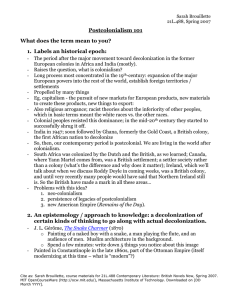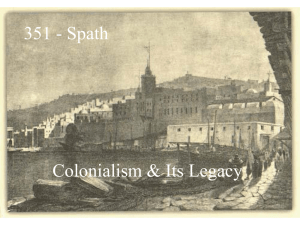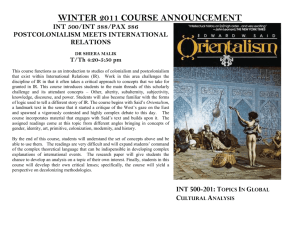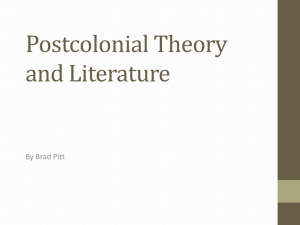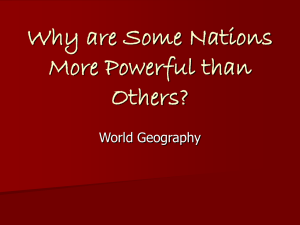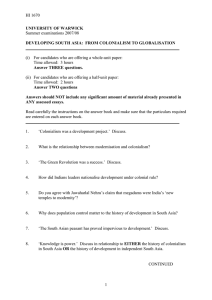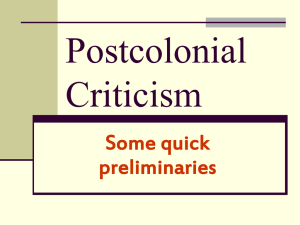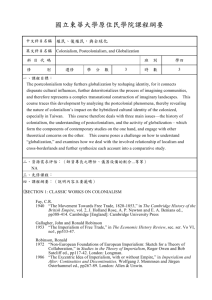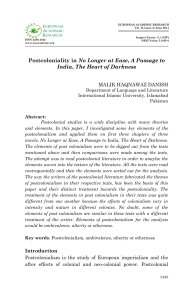Brief notes on Postcolonialism – in 3 points
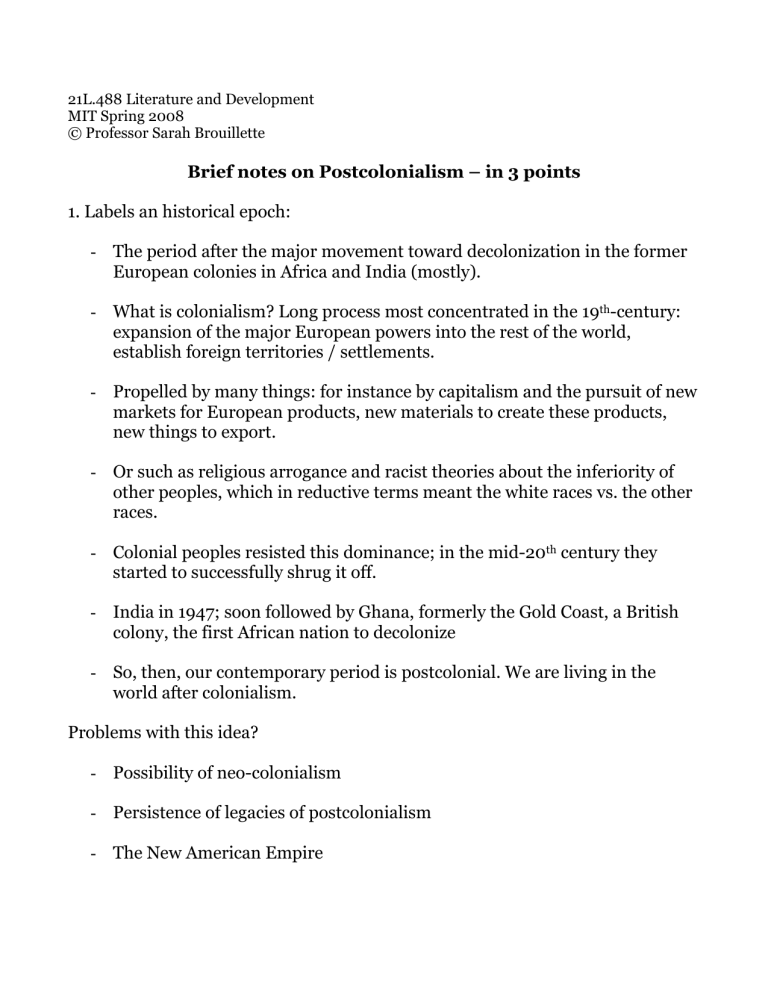
21L.488 Literature and Development
MIT Spring 2008
© Professor Sarah Brouillette
Brief notes on Postcolonialism – in 3 points
1. Labels an historical epoch:
-
The period after the major movement toward decolonization in the former
European colonies in Africa and India (mostly).
-
What is colonialism? Long process most concentrated in the 19 th -century: expansion of the major European powers into the rest of the world, establish foreign territories / settlements.
-
Propelled by many things: for instance by capitalism and the pursuit of new markets for European products, new materials to create these products, new things to export.
-
Or such as religious arrogance and racist theories about the inferiority of other peoples, which in reductive terms meant the white races vs. the other races.
-
Colonial peoples resisted this dominance; in the mid-20 th century they started to successfully shrug it off.
-
India in 1947; soon followed by Ghana, formerly the Gold Coast, a British colony, the first African nation to decolonize
-
So, then, our contemporary period is postcolonial. We are living in the world after colonialism.
Problems with this idea?
-
Possibility of neo-colonialism
-
Persistence of legacies of postcolonialism
-
The New American Empire
2. An epistemology (set of ideas about knowledge): a decolonization of certain kinds of thinking to go along with “actual” decolonization.
-
Look online at J. L. Gérôme, The Snake Charmer (1870). What do you imagine the Parisian viewers it was meant for made of it when they saw it?
-
Painted in Constantinople in the late 1860s, part of the Ottoman Empire
(itself modernizing at this time)
-
Note rigid binaries: exotic vs. domestic; rational vs. irrational; science vs. religion; enlightened vs. backward; correct vs. immoral or amoral; etc.
[Relates back to the characteristics of Enlightenment / modernity which we discussed in relation to postmodernism].
-
Stemming from an idea popularized by Edward Said and his book
Orientalism (1978): how certain kinds of European knowledge about “the rest” of the world made actual colonial domination possible
-
According to Said, the Occidental world, meaning the Western world, didn’t represent the reality of the East but rather the romantic notion of the
"Orient.” The Middle East and Asia were viewed with prejudice and racism.
They were depicted as backward and unaware of their own history and culture. Western writers and thinkers took on the self-assigned task of filling this “void” that they themselves imagined, creating a culture, history, and future promise for them.
-
These forms of knowledge need to be dismantled; here there is some overlap with postmodernism, as scholars have pointed out that there was no unbiased representation of the colonized parts of the world: the act of writing about those worlds was always determined by political interest and causes and by the basic socialization of the people doing the writing.
-
Colonized peoples were doing this kind of thinking long before the actual postcolonial period, though; so in a way there were “postcolonial” ways of thinking long before actual decolonization, ie. Franz Fanon, who was writing while Algeria was still under French rule
-
So, to sum up #2, “postcolonialism” is a way of thinking about knowledge production, and how certain kinds of knowledge about other peoples can act as a prop to economic or military or physical domination. And
2
producing alternative ideas about these colonized groups can be a very political thing.
3.
A movement or trend in literary studies.
-
After Said especially, who was writing from a position within the Western academy.
And writing not about “native” forms of knowledge produced by colonized people, but about the Western canon of literary texts and how it produced knowledge about the “other” parts of the world.
-
So the inequalities of colonialism carry on as a kind of arrangement of the production of knowledge; the nexus for the production of deconstructing or countering discourses that challenge the dominance of colonialist thought or practice is the WEST.
-
This is an especially sore point for more Marxist or radically Leftist thinkers, who said hey wait a minute colonialism didn’t happen because of certain ideas that Europeans had about the rest of the world; colonialism happened because people in the West had more military might and more money and could therefore impose themselves on others more successfully.
It isn’t ideas that make the world turn, it is economics, and certain economic inequalities persist (or are even more extreme in some cases) – so we should be paying attention to that rather than to “mere” representations in literature
-
So, to sum up #3, postcolonialism is a movement in the Western academy, something that happens after a bunch of people from formerly colonized nations move to the West and start writing about colonialism, and start talking about Western canonical texts that propped up colonialism. And soon they start talking about and teaching texts written mostly by other third world migrants to the first world, and sometimes by writers who continue to live in the third world.
-
This is too reductive by far, though, since certainly universities throughout the world (including in the formerly colonized nations) have scholars we would identify as participants in the global conversation about postcolonialism (#1 and #2). The question is, I guess: who controls the conversation?
3

